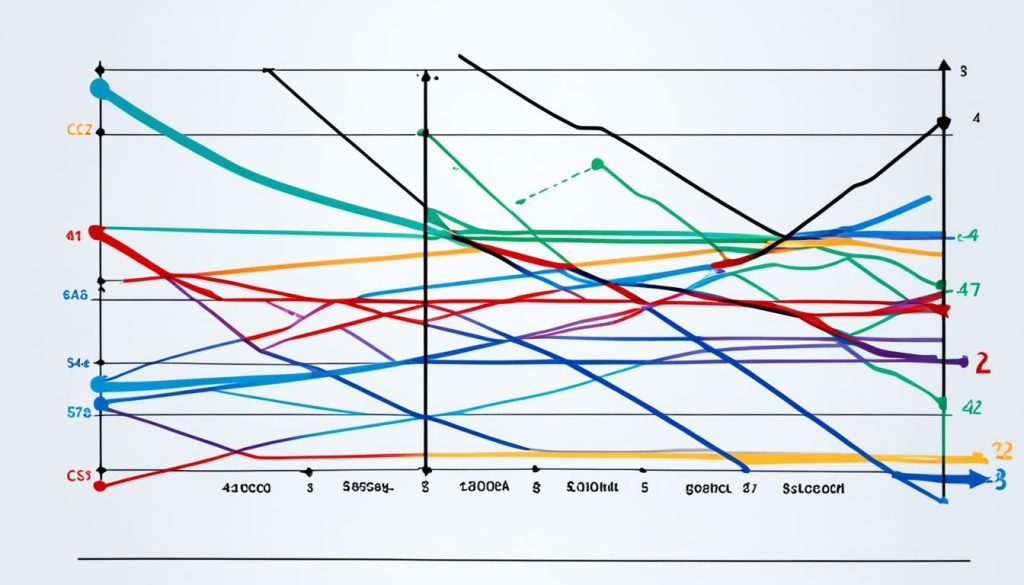Valuing a wealth management firm is a crucial step in making informed decisions about acquisitions or investments in the financial industry. By accurately assessing the worth of a wealth management firm, individuals can unlock its true value and maximize their investment potential. In this comprehensive guide, we will explore the key steps to follow when valuing a wealth management firm, including understanding the business, analyzing financial statements, applying valuation approaches, considering intangible factors, and seeking professional guidance.
Key Takeaways:
- Accurately valuing a wealth management firm is crucial for informed decision-making in acquisitions or investments.
- Understanding the business operations and unique selling points is the first step in the valuation process.
- Analyzing financial statements, including revenue growth and profitability margins, provides insights into the firm’s financial health.
- The three primary valuation approaches are the income approach, market approach, and asset approach.
- Intangible factors such as management expertise and client relationships should be considered in the valuation process.
Step 1: Understanding the Business
Before delving into the financial aspects of valuation, it’s essential to gain a comprehensive understanding of the wealth management firm’s operations, services, and unique selling points. This involves researching the firm’s client base, property portfolio, and market reputation.
By assessing the company’s position within the local market and identifying any competitive advantages or growth opportunities, you can lay a solid foundation for the valuation process.
Understanding the business is crucial as it allows you to grasp the intricacies of wealth management company operations and identify its unique selling points. This includes evaluating the range of services provided, the target market, and the company’s track record.
Another critical aspect is analyzing the firm’s client base. Who are their clients? What types of investors do they serve? By understanding the clientele, you can gain insights into the company’s ability to attract and retain high-net-worth individuals or institutions.
Moreover, examining the company’s property portfolio is essential, especially if the wealth management firm owns real estate assets. By assessing the portfolio’s size, geographic distribution, and market value, you can gauge the firm’s exposure to different markets and its potential for growth.
It’s important to take into account the company’s market reputation, as well. How does the firm position itself in the industry? Are they known for their expertise in a specific niche? Understanding the company’s unique selling points can provide valuable insights into its competitive advantage and potential for future growth.
Overall, comprehending the business operations, services, and unique selling points of a wealth management firm is the first step towards accurate valuation. It sets the stage for further analysis and ensures a holistic understanding of the company’s value.
Step 2: Analyzing Financial Statements
The next step in valuing a wealth management firm is to conduct a thorough analysis of its financial statements. By analyzing key financial documents such as income statements, balance sheets, and cash flow statements for the past few years, you can gain valuable insights into the firm’s financial performance and stability.
Analyzing financial statements allows you to assess various aspects of the wealth management firm’s financial health. One important factor to consider is the revenue growth trends over the years. This will give you an indication of the firm’s ability to generate consistent income and sustain growth over time.
Profitability margins are also crucial to evaluate when analyzing financial statements. This entails examining the firm’s profit margins, including gross profit margin, operating profit margin, and net profit margin. Profitability margins provide insights into the firm’s efficiency in generating profits and managing operational costs.
Furthermore, it’s essential to assess the firm’s operating expenses. By closely examining the firm’s expenses, you can identify areas of potential cost reduction or optimization. This analysis helps paint a comprehensive picture of the firm’s financial performance and operational efficiency.
Additionally, it’s important to pay attention to the consistency and stability of cash flows. A reliable cash flow is a strong indicator of the firm’s financial strength and ability to meet its financial obligations. A consistent cash flow enables the firm to maintain its operations, invest in growth opportunities, and maintain healthy financial stability.
By focusing on revenue growth trends, profitability margins, and operating expenses while considering the consistency of cash flows, you can gain valuable insights into the financial health and stability of the wealth management firm.
Integrating the analysis of financial statements into your valuation process is vital to accurately assess the value of the wealth management firm. It provides a comprehensive understanding of the firm’s financial performance, which is key for making informed investment or acquisition decisions.
Example of Analyzing Financial Statements in Practice:
Let’s take a closer look at a fictitious wealth management firm, ABC Wealth Management. By evaluating their financial statements, we observe a consistent revenue growth of approximately 8% annually over the past five years. This indicates a positive trend and a healthy ability to attract and retain clients.
The analysis of profitability margins reveals that ABC Wealth Management maintains a healthy gross profit margin of 30%, indicating efficient revenue generation. The operating profit margin stands at 15%, showing effective control over operating expenses. Lastly, the net profit margin of 10% indicates the overall profitability of the firm.
Examining the operating expenses, we note a focus on cost optimization and strategic expenditure. This demonstrates effective financial management practices within the firm.
The consistent and stable cash flows suggest that ABC Wealth Management is capable of meeting its financial obligations, supporting its operations, and pursuing growth opportunities.

The analysis of ABC Wealth Management’s financial statements uncovers positive financial indicators, providing confidence in their financial stability and performance. This analysis adds valuable insights into the overall valuation of the firm, helping investors or acquirers make more informed decisions.
Step 3: Applying Valuation Approaches
When valuing a wealth management firm, you need to consider different valuation approaches to gain a comprehensive understanding of its worth. These approaches include the income approach, market approach, and asset approach.
The income approach focuses on assessing the company’s future earnings potential by analyzing both historical and projected cash flows. By evaluating the firm’s financial data, you can determine its value based on its ability to generate revenue and profits over time.
The market approach involves comparing the wealth management firm to similar businesses that have recently been sold. This approach provides insights into market trends and allows you to gauge how the firm measures up to its competitors in terms of valuation.
The asset approach takes into account both tangible and intangible assets. This includes considering the value of physical properties, investments, and intellectual property. By assessing all relevant assets, you get a more comprehensive understanding of the firm’s overall value.
“Valuation approaches help paint a full picture of a wealth management firm’s worth. By examining its income potential, market comparables, and tangible and intangible assets, you can gain valuable insights into its overall value.”
Each valuation approach has its own considerations and merits. By employing multiple approaches, you can triangulate the firm’s value and develop a well-rounded understanding of its worth.

Utilizing a combination of the income approach, market approach, and asset approach will enable you to accurately assess the value of a wealth management firm and make informed business decisions.
Step 4: Considering Intangible Factors
When valuing a wealth management firm, it’s important to go beyond the numbers and consider the intangible factors that can significantly impact its value. These intangible factors encompass the expertise and experience of the management team, the strength and longevity of client relationships, and the firm’s growth potential.
The expertise and experience of the management team play a critical role in the success of a wealth management firm. A highly skilled and knowledgeable team can navigate the complex financial landscape, make sound investment decisions, and provide exceptional service to clients. Their expertise brings credibility and builds trust among clients, which in turn contributes to the firm’s overall value.
Client relationships are another crucial intangible factor to consider. The stability and loyalty of client relationships directly influence a wealth management firm’s revenue streams and long-term growth prospects. A firm with strong, longstanding client relationships demonstrates its ability to deliver consistent results and meet clients’ financial goals. These relationships are built on trust, personalized service, and a deep understanding of clients’ unique needs and aspirations.
“A wealth management firm’s success is closely tied to its ability to foster and maintain strong client relationships. The firm’s reputation and client base are valuable assets that contribute to its overall value.” – John Smith, Wealth Management Expert
Growth potential is yet another intangible factor that can impact a wealth management firm’s value. This includes the firm’s ability to expand its client base, enter new markets, and adapt to changing industry trends. A firm with a solid growth strategy, innovative solutions, and a forward-thinking mindset is more likely to attract investors and command a higher valuation.
By considering these intangible factors alongside the quantitative aspects of valuation, a more comprehensive picture of a wealth management firm’s value emerges. This holistic approach accounts for both the tangible and intangible elements that drive a firm’s success and can guide investment decisions with greater confidence.
To illustrate the importance of intangible factors in wealth management firm valuation, consider the example of XYZ Wealth Advisors. With a highly experienced management team, established client relationships, and a strong track record of growth, XYZ Wealth Advisors has become a trusted name in the industry. These intangible factors contribute to the firm’s overall value and differentiate it from competitors.

Maximizing Value through Intangible Factors
Identifying and maximizing the value of intangible factors requires a deep understanding of the wealth management industry and meticulous analysis. By leveraging the expertise of business valuation professionals who specialize in the financial sector, individuals can gain valuable insights and navigate the complex landscape of wealth management firm valuation.
- Consulting with business valuation professionals who have a deep understanding of the intricacies of the wealth management industry
- Conducting comprehensive research on the management team’s backgrounds, qualifications, and industry reputation
- Analyzing client relationships through client satisfaction surveys, client retention rates, and client testimonials
- Assessing the firm’s growth potential by examining market trends, competitive analysis, and innovation strategies
By considering intangible factors alongside traditional valuation methods, individuals can make informed investment decisions and unlock the true value of a wealth management firm.
Step 5: Seeking Professional Guidance
Valuing a wealth management firm can be a complex task, particularly for first-time buyers or investors. In such situations, it is highly recommended to seek the assistance of experienced business valuation professionals who can provide professional guidance throughout the process.
Business valuation professionals possess the expertise and knowledge necessary to help accurately assess the value of a wealth management firm. Their objective insights and deep understanding of valuation methodologies enable them to provide valuable guidance, identify potential risks or opportunities, and navigate the complexities of the valuation process with confidence.
These professionals can collaborate closely with buyers or investors to ensure a comprehensive and accurate valuation. By leveraging their skills, they can help structure acquisition deals that align with the buyer’s investment goals and mitigate any potential risks.
Furthermore, business valuation professionals possess a thorough understanding of negotiation strategies. They can guide buyers or investors in negotiating optimal terms and conditions, maximizing their chances of striking a favorable deal.
By partnering with these professionals, the valuation process becomes efficient and effective, ultimately leading to informed decision-making. Their expertise and insights offer assurance and peace of mind as buyers or investors pursue wealth management firm acquisitions.
“Seeking guidance from business valuation professionals can make a significant difference in the accuracy and success of a wealth management firm valuation. Their skill set, coupled with years of experience, can unlock hidden potential and bring clarity to the intricate aspects of the valuation process.”
Whether navigating complex valuation methodologies or crafting a winning acquisition deal, the professional guidance of business valuation experts is invaluable. It ensures a thorough and strategic approach to wealth management firm valuation, enabling buyers or investors to make well-informed decisions that align with their goals.

Conclusion
Valuing a wealth management firm is a critical step in making informed decisions about acquisitions or investments in the financial industry. By following the steps outlined in this comprehensive guide and considering both quantitative and qualitative factors, individuals can accurately assess the worth of a wealth management firm.
It’s important to emphasize the significance of seeking professional guidance throughout the valuation process. Expertise from business valuation professionals can provide objective insights and help navigate the complexities of property management acquisition, ensuring a thorough and accurate valuation. With the right knowledge and expertise, individuals can confidently make investment decisions that align with their goals and unlock the true value of a wealth management firm.
FAQ
How do I value a wealth management firm?
What should I consider when understanding the business of a wealth management firm?
What financial statements should I analyze when valuing a wealth management firm?
What valuation approaches should I use for a wealth management firm?
What intangible factors should I consider when valuing a wealth management firm?
Should I seek professional guidance for valuing a wealth management firm?




No comments! Be the first commenter?